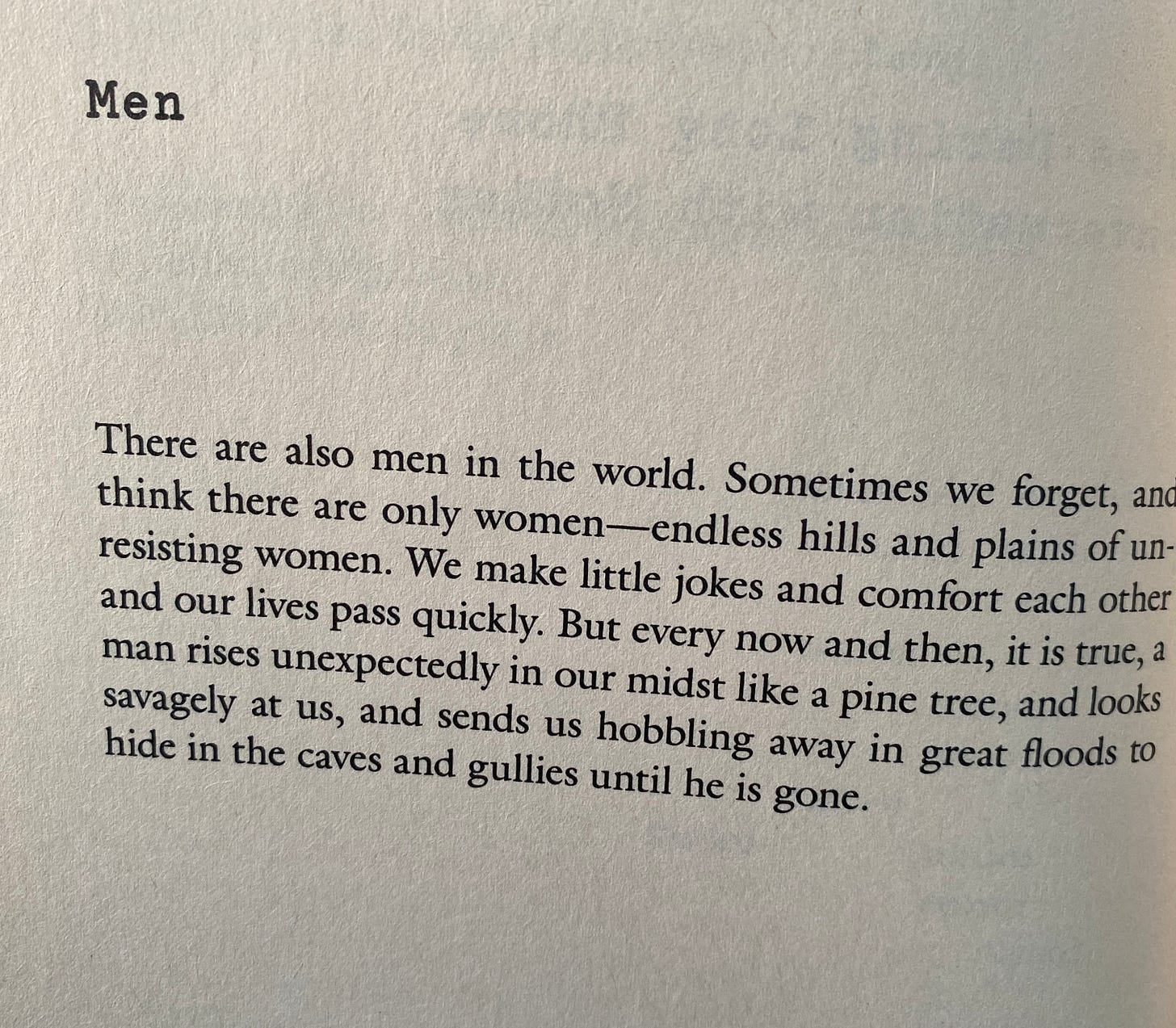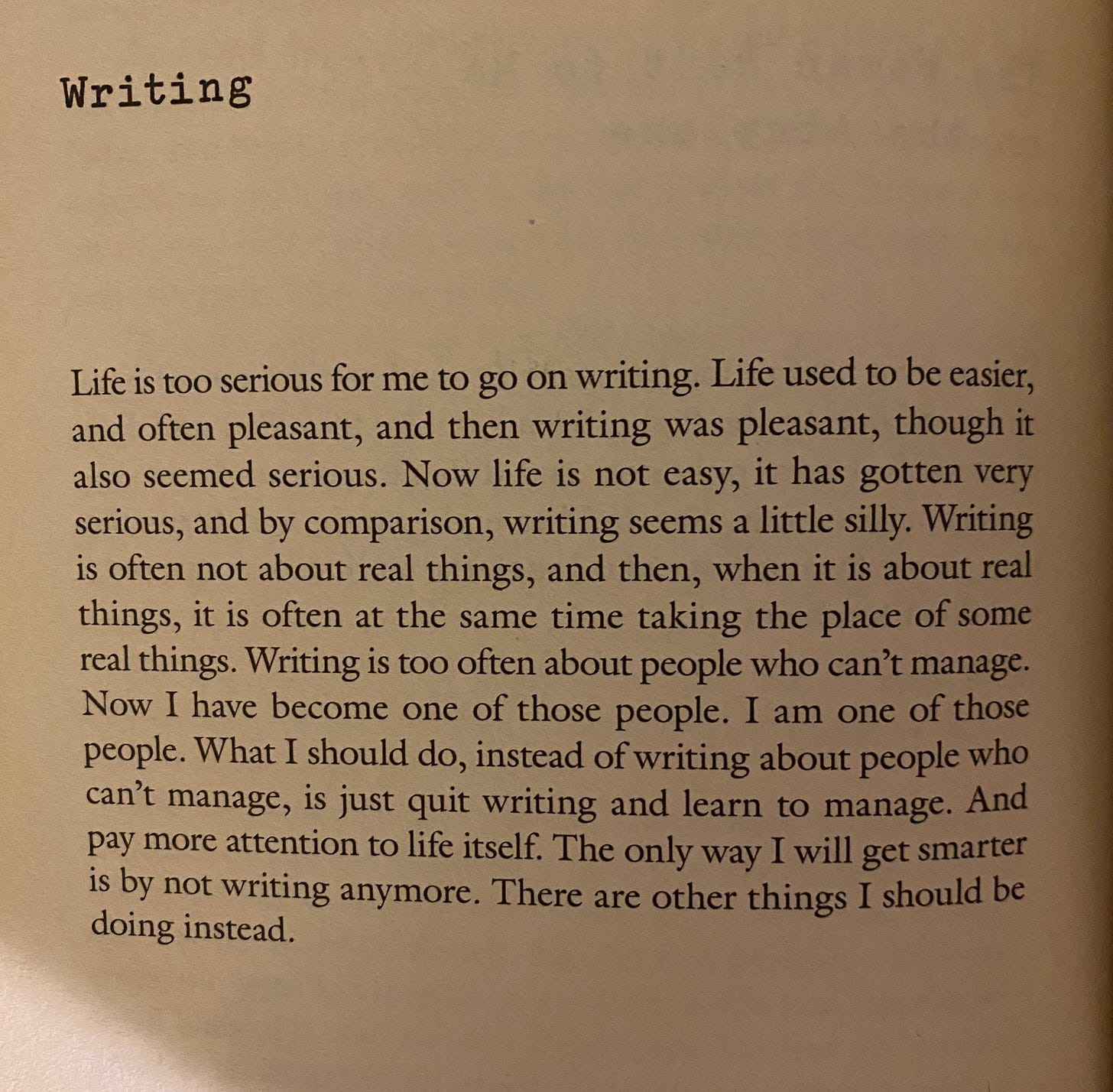
If you had asked me two weeks ago what I read for comfort, I’m not sure what I would have said. But now I know: my comfort reading is Lydia Davis.
Let’s back up and acknowledge why I might be looking for comfort reading in this moment. Two weeks ago, I hoped that a majority of American voters would choose a qualified woman of color over a convicted felon and rapist. That hope is gone. I still have lots of other hopes, just not that one.
In case you are wondering, my politics are don’t be a bully. Occasionally, someone tells me I’m wrong to see the patriarchy or its loutish cousin, white supremacy, as a root cause of political bullying. “I don’t think they meant it like that,” I am told. If my interlocutor is ambitious, he goes on to talk about some other overarching problem: capitalism, religion, nationalism, etc. The older I get, the more I believe, to put a spin on the old Sesame Street jingle, that none of these things is unlike the other. They are all predicated on the same big lie about whose lives, bodies, and voices matter and whose don’t.
In the first days after the election, it felt like someone had turned up the gravity. My feet felt like they would sink into the earth, followed by my knees, hips, and all the parts above that don’t seem to matter to the lawmakers in my state. I didn’t want to see anyone. I didn’t read past the headlines of most articles in the news, but I did read an op-ed by New York Times columnist Michelle Goldberg about the Russian notion of “internal emigration,” and this seemed to me like a healthy impulse.
In the New York Review of Books essay that Goldberg references, Viv Groskop writes:
Internal emigration is a way of retreating into yourself and shutting out the world along with everything that annoys or upsets you. The two Russian magazine editors defined internal emigration (also sometimes translated as “internal exile”) as finding a domestic space that feels like “your inner Copenhagen.”
Now is a good time to listen to the wisdom of Russian dissidents. They know how to maintain dissent for long periods of time, under extreme duress. (Memorizing poetry is key.) I also love the idea of inner Copenhagen. When I spent a summer in Russia in 1997, we flew in and out of Copenhagen. On the way in, Copenhagen seemed nice, but on our way out the city felt like paradise. Such beautiful, smiling people! Such gleaming public bathrooms! Such delicious food seasoned with herbs other than dill!
In my search for an internal exile, I thought about reading old books for comfort like some people do. I contemplated revisiting some beloved witchy novels, like Circe by Madeleine Miller or We Have Always Lived in the Castle by Shirley Jackson. Just imagining the rows of pickles and preserves in Jackson’s novel brings me a deep sense of orderly calm:
“All the Blackwood women had taken the food that came from the ground and preserved it, and the deeply colored rows of jellies and pickles and bottled vegetables and fruit, maroon and amber and dark rich green, stood side by side in our cellar and would stand there forever, a poem by the Blackwood women.”
I was having all these thoughts, and then I came across a collection of Lydia Davis’s short stories in a used bookstore.
Who is Lydia Davis?
Lydia Davis is an American author of short stories, essays, and novels. She also translates Flaubert and Proust. She has the rare distinction of appearing in both a Best American Short Stories and a Best American Poetry. Once described as “the master of a literary form largely of her own invention,” Davis is perhaps most well known for very short bursts of writing that blur the edges between poetry and prose.
Here is one of her stories in its entirety:
My Childhood Friend
Who is this old man walking along looking a little grim with a wool cap on his head?
But when I call out to him and he turns around, he doesn’t know me at first, either—this old woman smiling foolishly at him in her winter coat.
Here is another one that I’ve shared with several friends over the last two weeks:
Davis is also one of the rare authors to use her influence to stand up to the biggest bully in publishing. In “Why You Can’t Buy Lydia Davis’s New Book on Amazon,” Lily Meyer writes that Davis’s latest story collection, Our Strangers, is “the first new release by a major American writer that is designed to never be purchased on Amazon.”
I broke up with Jeff Bezos five years ago after my account was hacked, an experience I wrote about in My Amazon Doppelganger. I’m feeling rather smug about that decision now (though my 13-year-old daughter would love to tell you all the ways that I’m wrong).
Meyer’s article in The Nation offers a fascinating glimpse into how tricky it was for Davis and her publisher to work around Amazon. Davis persevered because she values “community and connection,” Meyer writes: “Such small kindnesses are the building blocks of Our Strangers and, perhaps, of Davis’s broader outlook.”
As fate would have it, I met Lily Meyer this past weekend at the Texas Book Festival, where she was promoting her debut novel, Short War. I was working on this Substack post in the morning before I drove down to the Texas Capitol to volunteer. I got to tell Meyer that her piece on Lydia Davis and Amazon was a footnote in Davis’s Wikipedia bio. It was one of those small connections between bookish people that make the Texas Book Festival feel like magic every year.
At first I wasn’t sure why I found comfort in reading Lydia Davis after the election, but now I think I’m beginning to understand.
Other interesting things
Sorry but monkeys are never actually going to type Shakespeare.
As a student of literature in grad school in the 2000s, I can’t imagine not having The Madwoman in the Attic as a reference. I enjoyed reading the New York Times obituary of Sandra Gilbert, who met her co-author, Susan Gubar, in an elevator at Indiana University in 1973. Together, these friends produced 10 works of literary scholarship over five decades. “They were the Lennon and McCartney of academia, but without the breakup or the rancor.”
Jack Kerouac’s 30 cool tips for writing really resonated with me today. I aspire to “Like Proust be an old teahead of time.”
On that note, I have a new essay in the Manifest Station about how motherhood totally screwed with my concept of time. “Fifteen years ago, I became a mother and lost track of time. The organizing principle of my life with my infant son was purely physical: milk in, milk out. I was a manager of bodily fluids. As I shuffled from room to room in our small San Francisco apartment, changing diapers and nursing pads, chasing down rags to catch the copious results of my son’s reflux, I caught myself muttering about ‘precious bodily fluids,’ like the crazy guy in Dr. Strangelove. That guy didn’t seem so crazy anymore.”
Not at all surprised to learn that Robert Smith is a big ole’ book nerd.
Bye!






There was a piece in Harper's some time ago by Davis about her experience in public office. It was small local personal universal and terrific.